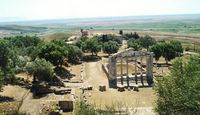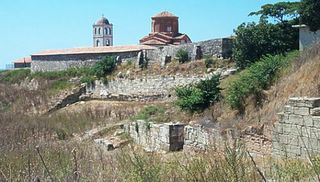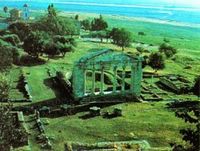Lorax Hall of Shame Award: Apollonia gets a highway
 Apollonia, near the shore of the Adriatic Sea in Albania, was a city-state founded by Greeks in 588 BCE; the city grew to 50,000 residents by the second century BCE and became a free Roman city after it sided with Julius Caesar during the war against Pompey. It was a cultural center of the arts until the 3rd century, when an earthquake rerouted a river and lead to its decline.
Apollonia, near the shore of the Adriatic Sea in Albania, was a city-state founded by Greeks in 588 BCE; the city grew to 50,000 residents by the second century BCE and became a free Roman city after it sided with Julius Caesar during the war against Pompey. It was a cultural center of the arts until the 3rd century, when an earthquake rerouted a river and lead to its decline.Austrians began excavations during W.W.I and the site has been worked sporadically since then, but much remains buried in the hill.
 More than 40 years ago, an Albanian farmer's tractor uncovered figurines, dated to the 4th-2nd century BC, outside the walls of Apollonia. Older still are more than 400 chipped stone artifacts, some dating back to the Middle Paleolithic period (200,000 to 35,000 years ago), some made using a technique, called Levallois, generally associated with Neanderthals.
More than 40 years ago, an Albanian farmer's tractor uncovered figurines, dated to the 4th-2nd century BC, outside the walls of Apollonia. Older still are more than 400 chipped stone artifacts, some dating back to the Middle Paleolithic period (200,000 to 35,000 years ago), some made using a technique, called Levallois, generally associated with Neanderthals.A large cemetery holds 400+ tumuli (burial mounds) and thousands of graves perhaps melding traditional Illyrian and Greek customs. Within the ruins of the ancient city, defensive walls, a theater, an obelisk, and temples have been found, as well as remains of a medieval Byzantine monastery. More recently a huge Greek temple has been unearthed outside the walls of the city-state.
 The area is beloved by archeologists because it is undeveloped and hence undisturbed; in addition, the majority of farmers practice traditional forms of agriculture, which preserve topsoil and consequently, few archaeological sites have disappeared due to soil erosion.
The area is beloved by archeologists because it is undeveloped and hence undisturbed; in addition, the majority of farmers practice traditional forms of agriculture, which preserve topsoil and consequently, few archaeological sites have disappeared due to soil erosion.| Via Cronaca, Apollonia in Peril, from the Times of London, April 25, 2005 A new highway, intended to speed access to Albania's still pristine beaches, threatens to destroy important and unexplored parts of the Classical city of Apollonia, which lies near the country’s Adriatic coastline.  Jack Davis (team leader from the University of Cincinnati) says the highway would cause "irreparable harm" to "the antiquities of the urban center of Apollonia." Jack Davis (team leader from the University of Cincinnati) says the highway would cause "irreparable harm" to "the antiquities of the urban center of Apollonia.""The proposed line, it is fairly certain, passes directly through the waterside limits of the ancient city as well as one of its Roman cemeteries," says Professor Richard Hodges in Current World Archaeology. Hodges, who has been working at Butrint (Albania’s most famed Classical site and one of its first archaeological parks), is concerned that the proposed road will prevent establishment of a similar park at Apollonia, even as Albania has begun to promote archaeo-tourism as a euro-earner. |

The Lorax Hall of Shame Award is given today to the Albanian Ministry of Transport, for its plan to build a highway through the site, reducing its great scientific (and tourist-destination) value, in order to get tourists to nearby beaches more quickly. More and more
Other highway projects which have earned the Lorax Hall of Shame award can be seen in the right sidebar.
Technorati Tags: Conservation, Lorax, History, Preservation












1 Comments:
This is awful news. Once heritage is gone, it's gone. The world could do without one more glass-stucco-concrete beachfront resort.
Post a Comment
<< Home